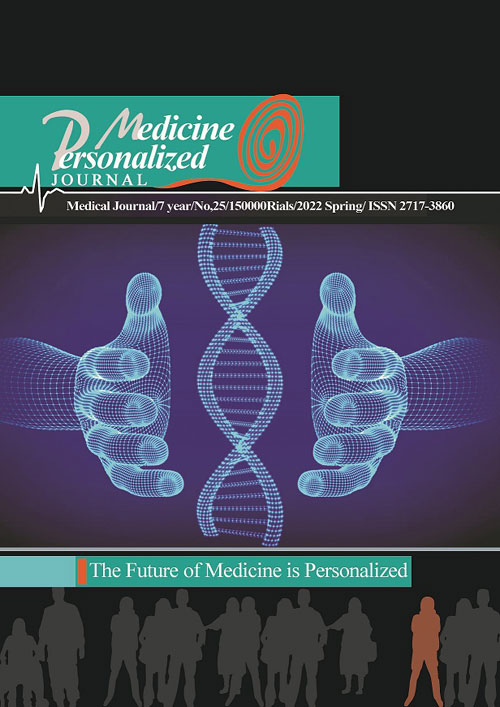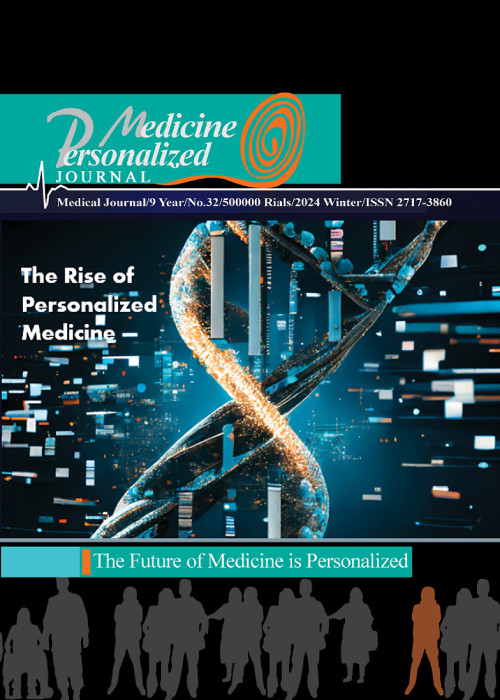فهرست مطالب

Personalized Medicine Journal
Volume:7 Issue: 25, Spring 2022
- تاریخ انتشار: 1401/05/07
- تعداد عناوین: 6
-
Pages 1-14
The pathophysiology and molecular pathways of breast cancer (BC) are still unclear, but it appears that BC is caused by the interaction between genetic susceptibility and environmental factors. Epidemiology studies have shown the increase risk of BC through polycyclic aromatic hydrocarbons (PAH) exposure. Environmental carcinogens induce disease pathways by altering the expression of specific genes that may be a consequence of epigenetic modifications. In order to understand the effects of PAHs in the BC risk, the epigenetic pathway may consider as an important key and likely play a role in BC initiation. Novel epigenetic biomarkers and treatments hold promise in the approch of personalized medicine. Here, we focus to review the epigenetic factors in relation to polycyclic aromatic hydrocarbons exposure that may influence BC risk.
Keywords: Breast cancer, DNA methylation, Non-coding RNAs, Personalized Medicine -
Pages 15-24Due to the lack of reliable biomarkers and a thorough understanding of the etiology of multiple sclerosis (MS), the treatment strategy in MS requires a personalized medicine framework that goes beyond the precision medicine idea. A patient-centered approach is necessary for personalized treatment, and the identification of pathophysiological processes should be employed to help classify diseases. Intracellular aspartic proteinase-A enzyme is expressed by the APR1 gene and is one of the important factors in the development of systemic candidiasis caused by Candida albicans. The aim of this study was molecular detection of fungal DNA in serum of MS patients and to evaluate the expression of the APR1 gene in C. Albicans isolates obtained from patients with multiple sclerosis (MS) and controls. The samples were obtained from 100 MS patients with candidiasis and 100 matched controls of healthy individuals during 2018 - 2019. The evaluation of APR1 gene expression was performed using the reverse transcriptase-polymerase chain reaction (RT-PCR) method. There was a statistically significant difference in APR1 gene expression of C. Albicans strains between MS patients (mean± SD: 0.5008 ± 0.09518) and the control group (mean± SD: 0.7513±0.10505) (P = 0.000). The mean values of EDSS were 1.4074 ± 0.0082 after antifungal treatment and 2.0519 ± 0.1123 before antifungal treatment (P = 0.000). Differences in active fungal infection between patients and controls indicate the importance and possible role of fungi in MS patients. The results suggested that APR1 gene expression in C. Albicans strains isolated from MS patients may be an important factor for invasive C. Albicans strains in the progression of MS disease. Because fungal infections in the serum causes more activity of the body’s immune and defense system and directly affect the activity of the immune system, it further destroys the central nervous system.Keywords: Personalized Medicine, multiple sclerosis, Detection of Fungal DNA, Candida albicans
-
Pages 25-29
Personalized medicine is the clinical treatment of diseases that is tailored to the physiologic, molecular genetics and lifestyle characteristics of the patient.Personalized medicine can be considered as a new approach to face diseases and develop traditional methods for their diagnosis and treatment. This novel field of medicine has the potential of changing identification and management of health problems strategies. Corona virus disease 2019 (COVID-19) is an infectious disease that affects the lungs of patients. This novel outbreak was first reported on 31 December 2019 in Wuhan, the capital of Hubei province of China, and it had many effects on people's lives all over the world in various economic, social and health fields until now. Since the start of the pandemic Covid-19, the World Health Organization (WHO) has expressed concern about the public health emergency. Although the disease has mild symptoms and similar to a common cold in most people, in some cases it can lead to pneumonia, acute respiratory distress syndrome, multi-organ dysfunction, and even death. Therefore, due to the different effects of this disease in individuals and even families, the role of personalized medicine becomes more significant and sensitive. Considering the rapid spread and global crisis of Covid-19, recent research has focused more on the control and treatment of the virus. The main goal of this paper is the investigation of different effects of the virus on patients and study of the personalized medicine roles in the control and treatment of the disease.
Keywords: Personalized Medicine, COVID-19, Corona Virus, Angiotensin-converting enzyme 2 (ACE2) -
Pages 30-35The reproductive system is affected negatively by the organophosphate insecticide diazinon (DZN). Numerous adverse effects on the reproductive system are brought on by it, including testicles degeneration, sex hormone disruption, decreased spermatogenesis, poor sperm quality, and fertility issues. The goal of the current study was to look at how diazinon affected the sperm parameter, sperm viability, and levels of sex hormones in adult male rats. The mature male rat was divided into five groups for this experiment: control (did not receive any substance), Placebo group (only 0.9 percent saline solution was consumed), and the other three groups received DZN (diazinon was administered at doses of 5, 10, and 20 mg / kg for 30 days). Within 30 days after the most recent doses, animals were killed. Radioimmunoassay was used to evaluate the amounts of serum testosterone, LH, and FSH. Sperm parameters such as motility and count were measured by CASA system. Sperm viability was also calculated by eosin-nigrosin staining. Following the injection of DZN, a substantial decrease in testicular weight and sperm concentration was seen. Additionally, DZN caused a significant decrease in serum testosterone concentration as well as sperm viability. Comparing DZN groups to the control and sham groups, LH and FSH levels were higher in the DZN groups. DZN is harmful to the reproductive organs and spermatogenic cells of mammals. Application of DZN should indeed be restricted to a specific framework.Keywords: Organophosphates, Diazinon, Sperm parameters, Oxidative stress
-
Pages 36-42
The COVID-19 outbreak offers an unmatched chance to take advantage of personalized medicine's benefits for the protection, detection, medication, monitoring, and administration of a fresh public health crisis. Antibiotics, which were formerly regarded as miracle cures and among the most difficult life-saving discoveries of the twentieth century, are now posing a hazard to society as a result of overuse and abuse. Antimicrobial resistance (AMR) is a widespread issue that is becoming worse, and the current COVID-19 pandemic might make things even worse. It has been shown that a significant portion of Covid-19 patients gets secondary microbiological infections. The medical industry is now facing difficulties because of this. As a result, several non-antibiotic techniques have been sought, and their processes have been examined, to slow the spread of AMR.
Keywords: Antibacterial resistance, COVID-19, Phyto-therapy, Phage-therapy -
Pages 43-47
Multiple sclerosis (MS) is a chronic inflammatory disease of the central nervous system (CNS), depicted by lymphocytic infiltration and demyelination. MS is associated with the up-regulation of pro-inflammatory and down-regulation of anti-inflammatory cytokines. The purpose of this experimental study was to evaluate the expression level of TGF-β1, TGF-β 2, TGF-β-R1, and TGF-β-R2 mRNAs in peripheral blood mononuclear cells (PBMCs) from MS patients and healthy controls using Real-Time PCR. Our findings indicated that the TGF-β-R1 expression level was 2.25 times higher in controls than in MS patients. Also, a significant correlation between normalized expression of TGF-β-R1 and TGF-β1, or TGF-β2 was observed. Therefore, these genes could likely play an important role in the etiology of MS.
Keywords: TGF-β Pathway, TGF- β receptors, multiple sclerosis, Expression Analysis


